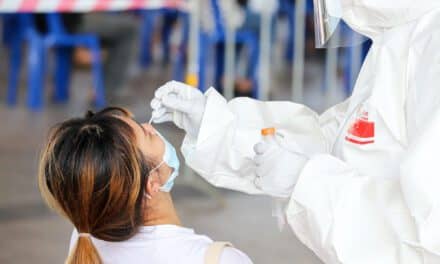By Annabel Entress

The recent outbreak of Severe Acute Respiratory Syndrome, or SARS, in the Far East and Canada sparked worldwide concern. Yet the emergence of this new disease holds some amazing similarities with the emergence of Acquired Immunodeficiency Syndrome (AIDS) 2 decades ago. Frost & Sullivan industry analyst Annabel Entress discusses how emerging diseases can act to spur on the global diagnostics industry.
deadly disease sweeps over the population and causes global pandemonium, not to mention drastically impacting the world’s economy. Sound dramatic? Well, it is, at least in the short term for the global diagnostics industry.
While not guaranteed to be a long-term revenue generator, the emergence of a new deadly disease acts as a catalyst for new diagnostic development, bringing with it positive PR, kudos, and perhaps even buoyed stock market value.
The recent outbreak of SARS in early 2003 was reminiscent of the attention surrounding the discovery of AIDS 20 years ago. While admittedly not on the same scale, both diseases are deadly. The lack of knowledge regarding mode of transmission, disease type, and origin of SARS understandably caused panic. In today’s modern medical society it is unusual that a disease emerges that is capable of causing such rapid and unforgiving devastation.
Naturally, the first step toward understanding the offending organism was to sequence the genome of the pathogen. The first organization to accomplish this task was the Genome Institute of Singapore. That job done, a rush ensued to create a valid diagnostic capable of rapid, accurate, and reliable diagnosis for the quickest appropriate treatment.
In the case of AIDS 20 years ago, there were not only debates as to who patented the diagnostic but also who discovered the disease. The two countries in question, France and the United States, eventually settled on an agreement that ensured both countries millions of dollars of royalty revenues per year. In the 20 years that have passed, little has changed in terms of pure cutthroat business to protect patents, and although the potential revenues from SARS are not as great as those from AIDS, companies have still rushed to the forefront of discovery diagnostics.
Among the “big” players to enter this year were Roche Diagnostics and Abbott Laboratories. Roche developed its PCR-based test very rapidly, working in conjunction with the Genome Institute of Singapore. The test is highly sensitive, according to Roche, and provides results in just 1 hour. Abbott also showed an interest, with collaborative partners including Celera Genomics, Quest Diagnostics, and Artus of Germany, providing a PCR-based test for research uses in April this year. The test takes just 2 hours to run and is based on samples taken from throat swabs, sputum, or feces. Both kits are now available for research and use in specific labs. Wider circulation will come upon full clearance of the tests, expected in about 18 months. Other players such as Focus Technologies, Eragen, and Medarex have also developed diagnostic tests.
Of course, this rush to develop a diagnostic test for the new killer is not purely altruistic. While sales of SARS diagnostics are not expected to act as a long-term revenue generator for the diagnostics industry (Roche expects to make a mere $10 million from their diagnostic test), the media circus surrounding the disease will undoubtedly bathe any company or institute working on it in a glowing light. Not a bad thing for some of these health care companies, where public praise is often thin on the ground.
Favorable public opinion can also reflect in the share price of the companies. The stock charts of both Abbott and Roche looked to be entering into a decidedly unhealthy downward trend approaching March this year. With the announcement of the work on SARS, they are hot again. This may not be the only cause of such a turnaround, but it plays a part. In a time when emerging diseases are holding the spotlight more than ever—SARS, West Nile Virus, AIDS, to name a few—it is a wise move to be fast to the market.
Annabel Entress is industry analyst for the European Drug Discovery Technologies division of Frost & Sullivan, an international growth consulting company. Email:[email protected].




